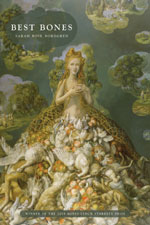Sarah Rose Nordgren: Best Bones
Sarah Rose Nordgren‘s Best Bones is a capacious book, interested inmachinery and wild beasts, in the wild and the domestic, in the positions in which women find themselves cast, in the liminal spaces between. Nordgren’s project calls to mind Eavan Boland’s famous essay on ”The Woman Poet: Her Dilemma,“ in which she discusses her desire to write about the domestic, about ’women's spaces,‘ without romanticizing or railing against her subject. Instead, she wants to write about it as she writes about any other subject matter: in this way, she neutralizes the pejorative cast of that space. ”After a woman writer leaves the center of a society,“ Boland writes, ”becomes a wife, mother and housewife, she ceases automatically to be a member of that dominant class which she belonged to when she was visible chieflyas a writer.“ The task is a difficult one, to write with seriousness about a performance that is absurd in its demands—the stitching together of a number of submissive selves, of woman-in-relation-to-another (husband, son, and house)—through that more ’dominant‘ position of the poet. Such an impossible demand, that a woman hold so many specific roles simultaneously, each with wildly varied agency. No wonder that younger women poets keep recasting the site where these performances happen, the domestic sphere, as an increasingly foreign space, as vague and unspecific as a fairy tale forest.
Nordgren’s poems seem interested in the slippage between that familiar landscapeand the unfamiliar territory beyond. The first poem in Best Bones, ”Fable,“ begins by the speaker pulling herself ”from the water by [her] hair.“ The poem, unpunctuated, with a stanza break after each line, allows its reader to drift slowly from scene to scene, its speaker now ”garage-entombed / Wearing mother’s nightgown,“ now ”The dark jealous girl walking / Barefoot before the king / So far north now and west of Helsinki.“ Against these shifting backdrops, we’re given glimpses of a narrative about ”the oldest daughter in the story,“ the child in the fable who is the first to set off to find her fortune and, often, the first to fail. But between the ocean and the mythical kingdom, we follow her through the garage, the most suburban of spaces. The most compelling moment in the poem is the gesture towards Helsinki, a place very of-this-world but also foreign enough to sound fictional to the young girl speaking this poem. If this is our tether to the real world, the place our narrator uses as her marker as she stands before the king, it is a tenuous one, at best.
The strongest moments in Best Bones are those that explore this fraught overlay of the real and the surreal. In ”August Postcard,“ we’re shown a mother who ”sews / a whole forest to replace the other / inventing fragile creatures.“ The mythic landscape of childhood, when lost, can be manufactured, until even that construction is destroyed—the next line tells us that ”Without warning, creditors clean / the accounts.“ In ”The Performance,“ Nordgren writes from the collective perspective of girls whose ”stepfathers / held their tempers,“ who weren’t on ”sand / and cherry pits.“ To escape this trauma is fantastical enough, putting them at a distance from the girl who claims she was chased down the ”tar-soaked road“ by dogs ”with three / heads, three tails. She says, / we might have mocked her story, / but never now.“ And with that line, we move from metaphor to altered landscape as the girl drives nails against her chest, ”eats / her own hands. Who are we now / to say that art should not destroy us?“ These poems often conclude that, as Paul Eluard famously said, there is another world, but in this one.
In Best Bones, every nightmarish horror has its prosaic antecedent. Nordgren moves us expertly through these twinned landscapes in poems that are nearly always narrated by a woman in some kind of transition: whether between adolescence and adulthood, as in ”The Performance,“ or, more harrowingly, between domestic and wild beings whose fingers want
to curl around the cold
edges of a dish, spend their long
lives washing bowl after bowl.
I fulfilled their desire
by kneeling in the grass
and taking one bowl down from
the tower at a time. (“The Monastery”)
Though Nordgren’s speakers lay out their desires in a logical, straightforward way—short phrases, clear language—the way in which they fulfill those desires is always crooked, abstract, unexpected. The speaker at the end of ”The Monastery“ finds herself in an ”exact diorama“ of herself, her legs ”heavy as pillars,“ her head, we’re told dispassionately, containing ”a hen whose beak can hold / just one pearl at a time.“ There is a chasm between what these speakers want to be and what is possible for them to be, one both absurd and terrifying. These poems, crisp and lovely in their language, are unwaveringly devoted to charting the strangeness of the female experience.
 Sarah Rose Nordgren
Sarah Rose Nordgren